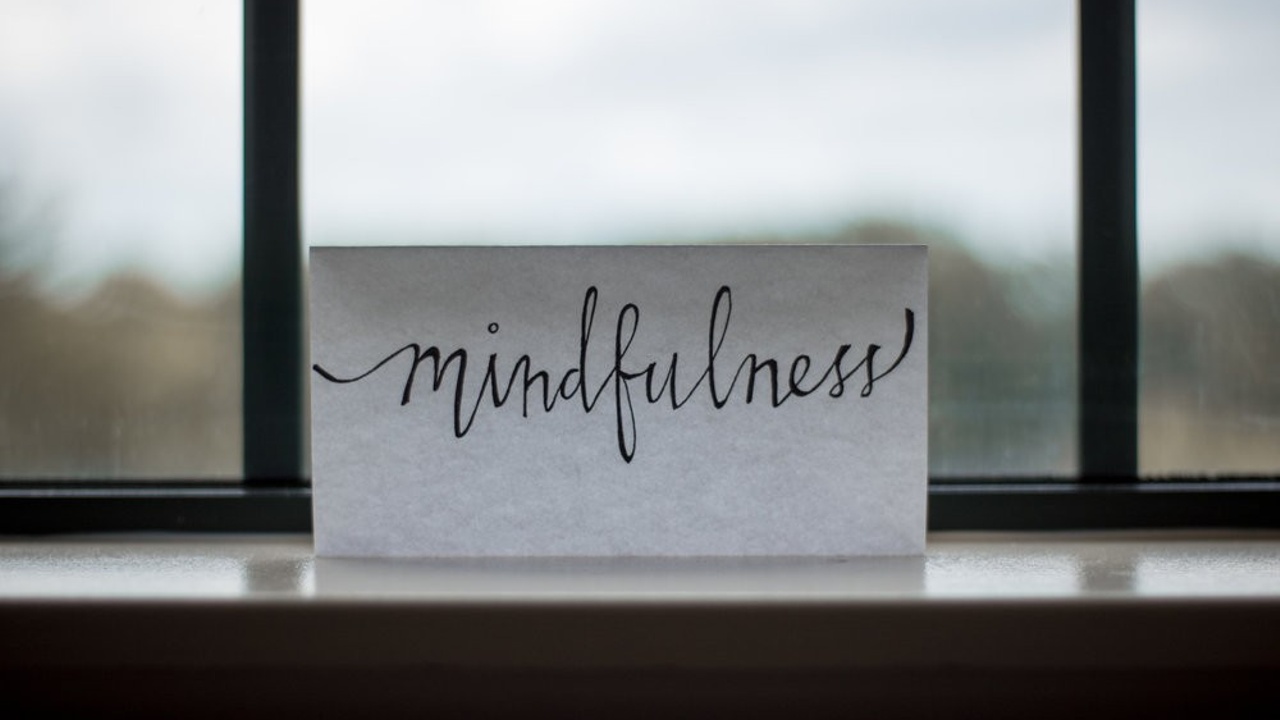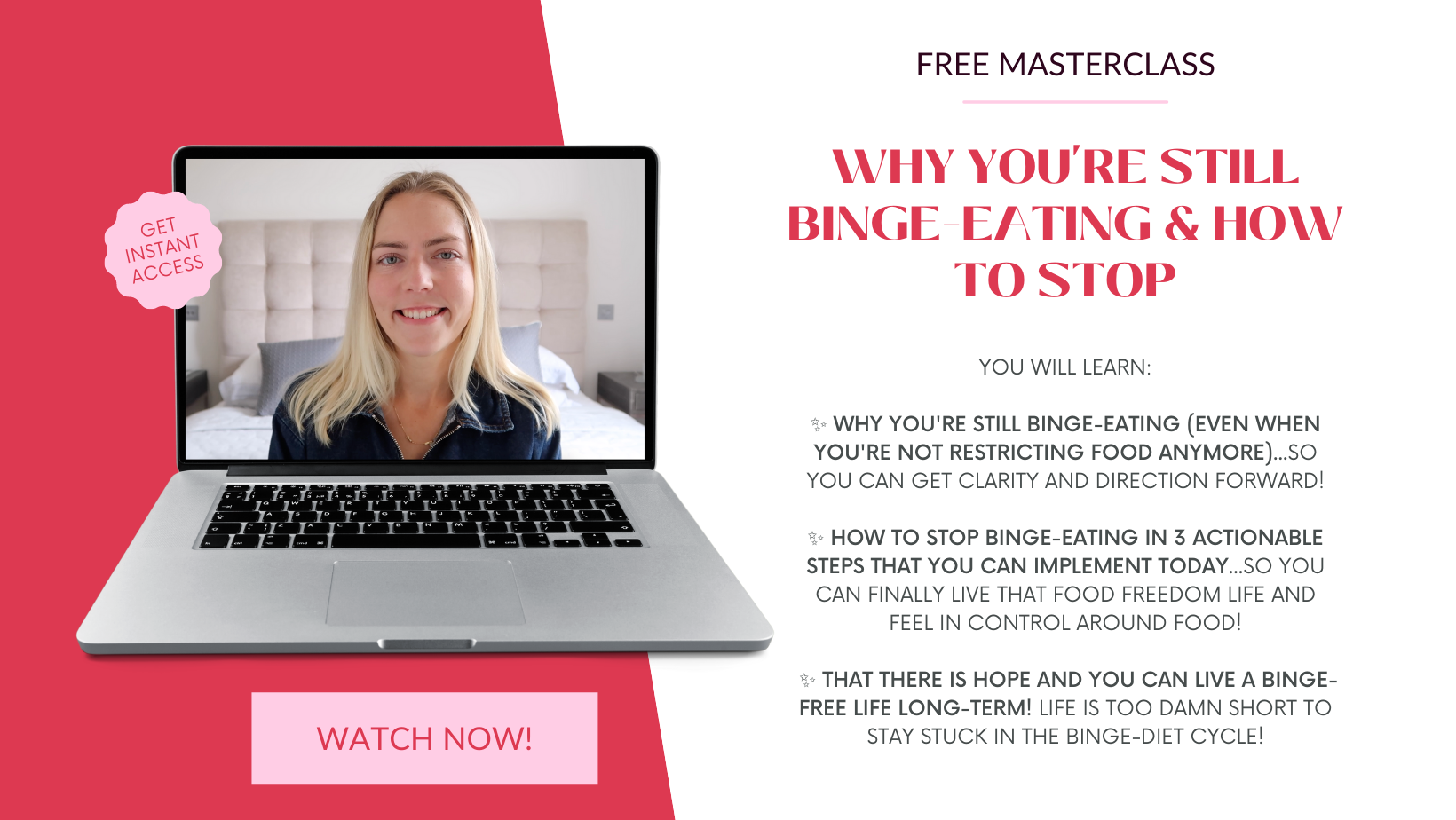How Mindful Eating Can Help With Binge Eating Recovery
Jan 31, 2021
We’ve all heard about it before - mindfulness. It’s everywhere! But what is it exactly, and how can it help with binge eating recovery?
WHAT IS MINDFULNESS
Mindfulness, in general, is the act of becoming more aware of your thoughts, feelings and external surroundings. It’s calmly acknowledging your thoughts in the present moment without any judgement.
Mindfulness plays a big role in binge eating recovery because oftentimes, we binge to numb out emotions. So learning to become more aware of them and actually feeling them rather than distracting is key. Only then can we realise those negative emotions are only temporary, and aren’t our truth. We don’t have to take them on as our identity. Have you ever thought, “Uh! I’m such an anxious person!”? That’s what I mean by identifying with your thoughts and feelings. You’re not actually an anxious person - you’re just experiencing sensations of anxiety!
Now, how about mindful eating? What exactly is that?
WHAT IS MINDFUL EATING?
The same tenets from mindfulness apply to mindful eating as well. We want to be attentive and present as we prepare and eat food. Here are some tips to get started:
NO DISTRACTIONS
Multitasking and eating is a recipe for not being able to listen deeply to our body’s needs and wants. We’ve all had the experience of going to the movies with our bag full of popcorn, and before the coming attractions are over, we are asking who ate all of our popcorn. When we are distracted, it becomes harder to listen to our body’s signals about food and other needs. With your next meal, try single-tasking and just eating, with no screens or distractions besides enjoying the company you are sharing a meal and conversation with.
APPRECIATE YOUR FOOD
Pause for a minute before digging into your meal to contemplate everything and everyone it took to bring the meal to your table. Silently express your gratitude for the opportunity to enjoy delicious food and the companions you're enjoying it with.
BRINGING ALL YOUR SENSES TO A MEAL
When you're cooking, serving, and eating your food, be attentive to colour, texture, aroma, and even the sounds different foods make as you prepare them. As you chew your food, try identifying all the ingredients, especially seasonings.
EAT SLOWLY BY TAKING SMALL BITES AND CHEWING THOROUGHLY
Slowing down is one of the best ways we can get our mind and body to communicate what we really need for nutrition. The body actually sends its satiation signal about 20 minutes after the brain, which is why we often unconsciously overeat. But, if we slow down, you can give your body a chance to catch up to your brain and hear the signals to eat the right amount. It's easier to taste food completely when your mouth isn't full. Put down your utensil between bites. Chew well until you can taste the essence of the food. (You may have to chew each mouthful 20 to 40 times, depending on the food.) You may be surprised at all the flavours that are released. Devote at least five minutes to mindful eating before you chat with your table mates.
UNDERSTAND YOUR MOTIVATIONS TO EAT
Often we listen first to our minds, but like many mindfulness practices, we might discover more wisdom by tuning into our bodies first. Rather than just eating when we get emotional signals, which may be different for each of us, be they stress, sadness, frustration, loneliness or even just boredom, we can listen to our bodies. Is your stomach growling, energy low, or feeling a little lightheaded? Too often, we eat when our mind tells us to, rather than our bodies. True mindful eating is actually listening deeply to our body’s signals for hunger. Ask yourself: What are your body’s hunger signals, and what are your emotional hunger triggers?
Now that we have some clarity on what mindful eating is and how you can incorporate it, how exactly does it help with binge eating?
HOW MINDFUL EATING HELPS BINGE EATING RECOVERY
There are two main applications of mindful eating in recovery…
MINDFUL EATING DURING THE DAY
First of all, by being more mindful while eating during the day, we get to fully experience the pleasure and satisfaction of those flavours. Mindful eating helps our body appreciate the eating experience, and so you feel more satisfied. When we eat mindlessly during the day, our body doesn’t fully realise that we’ve eaten that much. So later on at night, your body and mind feel like they need extra food. Cravings may build up (even if they’d been technically satisfied during the day) and you’ll go to binge at night.
HOW ABOUT MINDFUL EATING DURING A BINGE?
I could tell you to try mindful eating during a binge - to slow down and taste the flavours. To chew slowly and notice fullness earlier. But I know that it’s unrealistic. I know that during a binge you feel so out-of-control and mindless that it’s unfair to suggest mindful eating. I know I had tried it during my bingeing years but it never worked. All I wanted to do was to binge and nothing could stop me.
MINDFULNESS BEFORE A BINGE
But there is another moment that you can apply mindful eating - just before a binge. It may be a bit difficult at first to interrupt your usual routine of grabbing snacks from the kitchen or rushing to the supermarket for your favourite binge food. I know that. But it’s easier to apply mindfulness before the deed has begun than try to do it during.
So before a binge is the time to reflect on what you’re feeling and what you body wants. It can be the time to ask yourself, “Am I really hungry, or is there something else I need in this moment”, and “What am I feeling?” Reflecting on such questions can help you work through urges to binge and identify what you really need to adequately nourish yourself.
MINDFULNESS WHILE PREPARING & SHARING FOOD
This one really helped in my recovery. During my bingeing years, food became the enemy - during the day and at night when I would binge. It was just calories that were making me gain weight and feel bad about myself. I stopped seeing food as a way to bond and connect with people. As a means to explore and try new flavours and recipes. I was scared to try new recipes because it meant more variation and potential to binge. If I just kept eating the same healthy things during the day, surely then I could keep control and lose weight. Not quite…
During recovery, I started to see the joy in food again. I wasn’t afraid to try new recipes. To eat out at restaurants more. To cook together with people and bond over it. Now, cooking dinners with my boyfriend is a practice of mindfulness in itself. We slow down and focus on the task at hand. We appreciate the effort put in to creating the dish. And we eat the final dish at the table, savouring the flavour. All of this combined helped me so much!
Did this inspire you? If so, pop down below to see the Takeaway Task. Try to integrate these learnings into your life!
TAKEAWAY TASK
-
Practice mindful eating during one meal today - go through all of the steps in the lesson and try to apply a bit of each.
-
Next time you’re going for a binge - interrupt this pattern and ask yourself a few questions: “Am I really hungry, or is there something else I need in this moment”, and “What am I feeling?”
Start your food and body healing journey with the FREE masterclass
"Why You're Still Binge-Eating & How To Stop"


